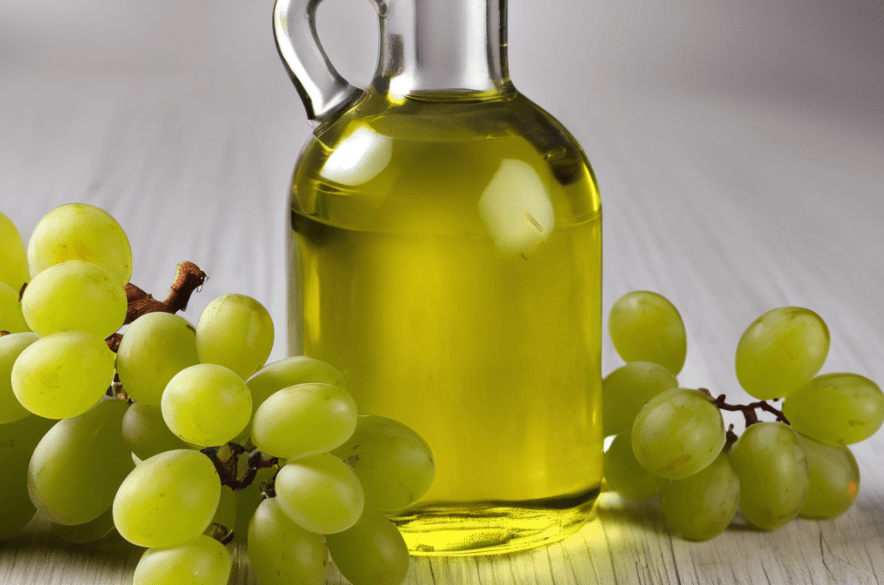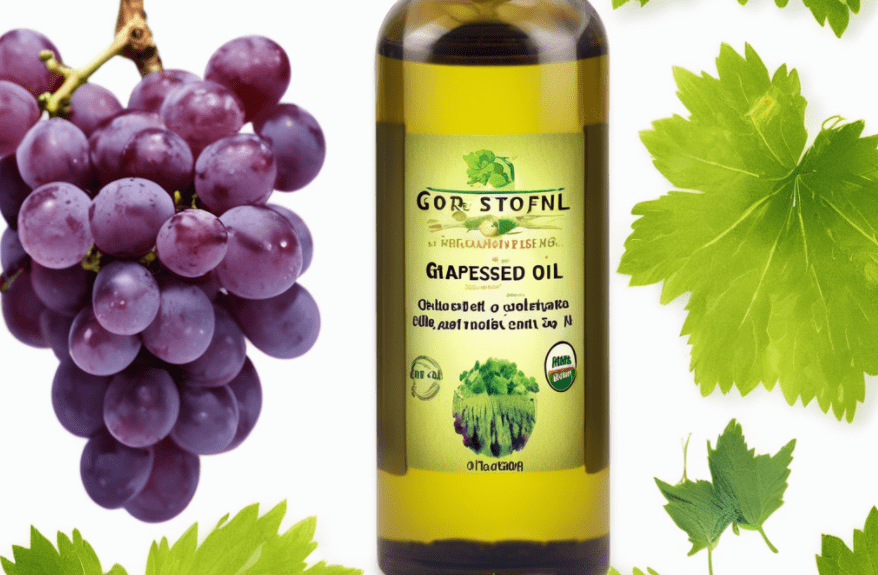IN-THE-NEWS
16 Amazing Benefits Of Grapeseed Oil and How to Use It
Published
5 months agoon
By
1oo9t
Grapeseed oil might not be the first oil that comes to mind when you think about healthy cooking or skincare, but it’s worth your attention! Extracted from the seeds of grapes, this oil is packed with nutrients that can do wonders for your health and beauty routines. In this article, we’ll explore 16 amazing benefits of grapeseed oil and how you can easily incorporate it into your life.
What is Grapeseed Oil?
Grapeseed oil is derived from the seeds of grapes, a byproduct of winemaking. As wine production generates a significant amount of grape seeds, extracting oil from these seeds is an efficient way to utilize what would otherwise be waste…Click Here To Continue Reading>> …Click Here To Continue Reading>>
The oil has gained popularity over the years due to its light flavor and high smoke point. This makes it suitable for various cooking methods. Plus, It is often marketed as a healthier alternative to other oils due to its high content of polyunsaturated fats and vitamin E.
Nutritional Profile of Grapeseed Oil
Grapeseed oil has a unique nutritional profile that makes it stand out among cooking oils. Here’s a breakdown of the nutritional content found in one tablespoon (14 grams) of grapeseed oil:
| Nutrient | Amount per 1 Tablespoon (14g) | % Daily Value |
|---|---|---|
| Calories | 120 | – |
| Total Fat | 14 g | 22% |
| Saturated Fat | 1.3 g | 7% |
| Monounsaturated Fat | 2 g | – |
| Polyunsaturated Fat | 9.5 g | – |
| Trans Fat | 0 g | – |
| Cholesterol | 0 mg | 0% |
| Sodium | 0 mg | 0% |
| Total Carbohydrates | 0 g | 0% |
| Sugars | 0 g | – |
| Protein | 0 g | 0% |
| Vitamin E | Approximately 3.9 mg | 26% |
| Omega-6 Fatty Acids | Approximately 9.5 g | – |
In addition to these nutrients, grapeseed oil contains phenolic antioxidants and phytosterols. The high levels of omega-6 fatty acids make it an excellent source of essential fatty acids that our bodies cannot produce on their own.
16 Amazing Benefits Of Grapeseed Oil and How to Use It
1. Rich in Nutrients
Grapeseed oil is a nutrient-dense oil that contains a wealth of beneficial compounds. It is particularly high in vitamin E, providing about 60-120 mg per 100 grams. It is significantly more than many other oils like olive oil.
Vitamin E is a powerful antioxidant that helps protect cells from oxidative damage caused by free radicals. Additionally, grapeseed oil is rich in polyunsaturated fats, especially omega-6 fatty acids. This is crucial for maintaining healthy bodily functions.
Moreover, grapeseed oil contains phytosterols, which can help lower cholesterol levels and improve heart health. Incorporating this oil into your diet can help ensure you’re getting these essential nutrients while adding flavor to your meals.
2. Heart Health
One of the standout benefits of grapeseed oil is its positive impact on heart health. Studies have shown that it can significantly raise HDL (good cholesterol) levels while lowering LDL (bad cholesterol) and triglycerides.
This balance reduces the risk of heart disease and related conditions. The high concentration of polyunsaturated fats in grapeseed oil helps to improve lipid profiles. This makes it an excellent choice for those looking to support their cardiovascular health.
The antioxidants present in the oil combat oxidative stress, further protecting the heart from damage caused by free radicals. Regular consumption may also help reduce blood pressure and improve overall vascular function. For those looking to maintain a healthy heart, using grapeseed oil as your primary cooking oil can be a smart choice.
3. Anti-Inflammatory Properties
Chronic inflammation is linked to numerous health issues, including heart disease and arthritis. Grapeseed oil has demonstrated anti-inflammatory effects due to its high levels of polyphenols and antioxidants, such as oligomeric proanthocyanidins (OPCs). These compounds inhibit the release of arachidonic acid, which plays a role in inflammatory responses.
By incorporating grapeseed oil into your diet, you may help reduce inflammation in the body, potentially alleviating symptoms associated with chronic inflammatory conditions such as arthritis and asthma.
This makes it a valuable addition for those managing inflammatory diseases. It can be particularly beneficial when used in salad dressings or drizzled over cooked dishes to maximize its health benefits.

4. Skin Health
If you’re looking for a skincare hero, grapeseed oil could be it! Its lightweight texture makes it perfect for moisturizing without clogging pores, making it suitable for oily and acne-prone skin types. The high levels of vitamin E in grapeseed oil help protect the skin from UV damage and promote healing.
Regular application can lead to improved hydration, elasticity, and overall skin texture. Many people use grapeseed oil as a natural moisturizer or as part of their skincare routine to combat dryness and signs of aging. It’s also often used in DIY beauty treatments due to its nourishing properties.
Additionally, grapeseed oil contains linoleic acid, which has been shown to help reduce acne breakouts by regulating sebum production in the skin. This makes it an excellent choice for those struggling with acne-prone skin.
5. Hair Care
For those seeking healthier hair, grapeseed oil can be a game-changer. Its lightweight consistency allows it to act as a natural conditioner that adds moisture and shine while preventing breakage. It helps reduce frizz and enhances manageability without weighing hair down.
Additionally, grapeseed oil’s antioxidant properties can protect hair from environmental damage caused by pollution and UV exposure. This makes it an ideal treatment for maintaining vibrant and healthy locks.
Many people find that using grapeseed oil as a leave-in conditioner or scalp treatment promotes hair growth and improves overall hair health.
You can easily incorporate grapeseed oil into your hair care routine by applying a small amount to damp hair after washing or using it as a hot oil treatment before shampooing for an extra boost of hydration.
6. Weight Management
If you’re trying to manage your weight, incorporating grapeseed oil into your meals might help! Its polyunsaturated fats can promote feelings of fullness by enhancing satiety hormones such as leptin. This helps you resist cravings and potentially reduces overall calorie intake.
By replacing saturated fats with healthier options like grapeseed oil in your diet, you may find it easier to maintain a healthy weight while enjoying delicious meals. Additionally, some studies suggest that grapeseed oil may improve insulin sensitivity. This is an essential factor in weight management.
Using grapeseed oil as part of balanced meals can make healthy eating more enjoyable without sacrificing flavor or satisfaction.
7. Cooking Versatility
One of the best things about grapeseed oil is its high smoke point (around 420°F or 216°C). This makes it perfect for various cooking methods such as frying, sautéing, and baking without losing its nutritional value or flavor.
Its mild taste allows it to blend seamlessly into dishes without overpowering them. Whether you’re preparing a stir-fry or drizzling it over roasted vegetables, grapeseed oil enhances flavors while providing health benefits. It’s also an excellent choice for salad dressings or marinades due to its light texture.
You can experiment with grapeseed oil in various cuisines—try using it in Asian stir-fries or Mediterranean salads for a delightful twist!
8. Antioxidant Properties
The antioxidants found in grapeseed oil play a crucial role in combating oxidative stress within the body. Regular consumption may contribute to better overall health by neutralizing harmful free radicals that can lead to chronic diseases such as cancer and heart disease.
The presence of proanthocyanidins—powerful antioxidants. This makes grapeseed oil particularly effective in promoting cellular health and longevity. These antioxidants also support skin health by protecting against premature aging caused by oxidative damage.
Incorporating grapeseed oil into your daily diet can be an easy way to boost your antioxidant intake while enjoying flavorful meals.

9. Supports Bone Health
Emerging research suggests that grapeseed oil may support bone health. It can enhance calcium absorption and promote bone density through its anti-inflammatory properties.
This benefit is especially important as we age and seek to prevent conditions like osteoporosis. By incorporating grapeseed oil into your diet—especially alongside calcium-rich foods—you may help maintain strong bones throughout your life.
You can consider using grapeseed oil when preparing dishes that contain dairy or leafy greens to maximize their bone-supporting potential.
10. Enhances Blood Circulation
Grapeseed oil has been shown to improve blood circulation. It can relax blood vessels and reduce blood pressure levels through its ability to inhibit platelet aggregation. READ FULL STORY HERE>>>CLICK HERE TO CONTINUE READING>>>
This effect contributes to better oxygenation of tissues and organs throughout the body. This promotes overall cardiovascular health and vitality. Plus, Improved circulation can also enhance energy levels and support physical performance during exercise.
11. May Aid Digestion
Incorporating grapeseed oil into your meals might support digestive health. It can promote the secretion of digestive enzymes that enhance nutrient absorption and gut function.
A healthy digestive system is vital for overall well-being. Thus adding this beneficial oil to your diet can help improve digestive efficiency. This can make you feel more comfortable after meals.
You might consider using grapeseed oil as part of salad dressings or drizzling it over cooked vegetables for added flavor while supporting digestion at the same time.
12. Natural Preservative
Thanks to its antioxidant properties, grapeseed oil can act as a natural preservative in food products. It can prevent rancidity and extend shelf life without the need for artificial additives or preservatives.
This makes it an excellent choice for those looking to maintain freshness in their cooking while avoiding chemical preservatives commonly found in processed foods.
Using grapeseed oil when preparing homemade sauces or dressings not only adds flavor but also helps keep them fresh longer!

13. Improves Skin Elasticity
Want firmer skin? Regularly applying grapeseed oil may improve skin elasticity. This makes it look more youthful over time due to its hydrating properties and nutrient content that supports collagen production.
Many people find that incorporating this lightweight oil into their skincare routines helps combat signs of aging while leaving their skin feeling soft and supple.
You can consider using grapeseed oil as part of your daily moisturizing routine or mixing it with other essential oils for added benefits!
14. Reduces Scars and Stretch Marks
If you’re dealing with scars or stretch marks, grapeseed oil might be able to help! Its moisturizing properties promote skin regeneration and healing due to its high vitamin E content. This potentially reduces the appearance of these marks over time when used consistently.
Many people have found success using this natural remedy on areas prone to scarring or stretch marks during pregnancy or weight fluctuations. This is a simple yet effective addition to any skincare regimen!
15. Supports Immune Function
The antioxidants in grapeseed oil also play a role in supporting immune function. It can neutralize free radicals that can compromise your immune system’s effectiveness—helping you fend off illnesses more effectively.
A robust immune system is essential for staying healthy year-round. Thus incorporating nutrient-rich oils like grapeseed into your diet can provide additional support during cold seasons or times of increased stress on the body.
16. Culinary Flavor Enhancer
Finally, one of the most delightful aspects of grapeseed oil is its light flavor that enhances various dishes without overpowering them. This makes it perfect for salad dressings, marinades, or simply drizzling over cooked vegetables or grains for added taste and nutrition.
Its versatility allows you to experiment with different cuisines; try using it in Mediterranean dishes alongside herbs like basil or oregano for delicious results!

Best Grapeseed Oil Recipes
Now that you know about the amazing benefits of grapeseed oil, why not try incorporating it into some delicious recipes? Here are a few ideas:
1. Creamy Cauliflower Soup
A warm bowl of creamy cauliflower soup is perfect for any season!
Ingredients:
- 1 head cauliflower, chopped
- 1 onion, diced
- 2 cloves garlic, minced
- 4 cups vegetable broth
- Salt and pepper to taste
- 2 tablespoons grapeseed oil
- Fresh herbs (like rosemary) for garnish
Instructions:
- Heat the grapeseed oil in a pot over medium heat.
- Sauté onions until translucent; add garlic.
- Add cauliflower and vegetable broth; bring to a boil.
- Simmer until cauliflower is tender (about 15 minutes).
- Blend until smooth; season with salt and pepper.
- Garnish with fresh herbs before serving!
2. Red Lentil Soup with Lemon
This bright soup is packed with flavor!
Ingredients:
- 1 cup red lentils
- 1 onion, diced
- 2 carrots, chopped
- 4 cups vegetable broth
- Juice of one lemon
- Salt and pepper to taste
- 2 tablespoons grapeseed oil
- Cumin (optional)
Instructions:
- Heat the grapeseed oil in a pot; sauté onions until soft.
- Add carrots; cook for another few minutes.
- Stir in lentils and broth; bring to boil.
- Simmer until lentils are tender (about 20 minutes).
- Stir in lemon juice; season with salt, pepper, and cumin if desired.
- Serve warm!
3. Homemade Salad Dressing
Elevate any salad with this simple dressing!
Ingredients:
- 1/2 cup grapeseed oil
- 1/4 cup apple cider vinegar
- 1 tablespoon Dijon mustard
- Salt and pepper to taste
- Optional: minced garlic or herbs
Instructions:
- In a jar, combine all ingredients.
- Shake well until emulsified.
- Drizzle over salads before serving!
Potential Side Effects and Risks
While grapeseed oil offers numerous health benefits, there are some potential side effects and risks associated with its consumption:
- Increased Risk of Cancer: Some types of commercially produced grapeseed oils may contain high levels of Polycyclic Aromatic Hydrocarbons (PAHs), which are known carcinogens. Although this risk varies based on processing methods, it’s essential to choose high-quality oils when possible.
- Weight Gain: Like most oils, grapeseed oil is calorie-dense due to its fat content. Consuming large amounts without adjusting overall caloric intake could lead to weight gain over time, increasing risks associated with obesity-related diseases.
- Omega-6 Fatty Acids Imbalance: Grapeseed oil is high in omega-6 fatty acids, which are essential but should be balanced with omega-3 fatty acids. A diet excessively high in omega-6s relative to omega-3s may contribute to inflammation. So it’s beneficial to pair foods rich in omega-6s with sources rich in omega-3s like fish or flaxseeds.
- Allergic Reactions: Although rare, some people may experience allergic reactions when using grapeseed products on their skin. Symptoms may include redness, itching, or rash. It’s advisable to perform a patch test before widespread application if you’re trying it topically for the first time.
- Processing Concerns: Many commercially available grapeseed oils undergo chemical extraction processes involving solvents like hexane. Opting for cold-pressed or expeller-pressed varieties ensures you’re getting higher-quality products without harmful residues.
FAQs
1. What is grapeseed oil used for?
Grapeseed oil is versatile and can be used for cooking, baking, frying, and salad dressings. It’s also a popular ingredient in skincare and haircare products due to its moisturizing properties.
2. Can I use grapeseed oil for high-heat cooking?
Yes, grapeseed oil has a high smoke point of around 420°F (216°C), making it suitable for various cooking methods such as frying, sautéing, and baking without breaking down or producing harmful compounds.
3. How should I store grapeseed oil?
To maintain its freshness and extend its shelf life, store grapeseed oil in a cool, dark place away from direct sunlight. A tightly sealed container can help prevent oxidation.
4. Can I use grapeseed oil on my hair?
Yes! Grapeseed oil can be beneficial for hair health. It moisturizes the scalp, strengthens hair strands, and adds shine without leaving a greasy residue. You can apply it directly or mix it with other oils for added benefits.
5. Is grapeseed oil suitable for people with nut allergies?
Yes, grapeseed oil is derived from grape seeds and is not a nut-based product, making it generally safe for individuals with nut allergies. However, it’s always best to consult with a healthcare provider if you have specific concerns.
6. What’s the difference between cold-pressed and refined grapeseed oil?
Cold-pressed grapeseed oil is extracted without heat or chemicals, preserving more nutrients and flavor. Refined grapeseed oil undergoes processing that may involve heat and chemicals, resulting in a more neutral flavor.
Related
You may like
IN-THE-NEWS
14 Healthy Drinks That Make You Poop Immediately
Published
1 month agoon
February 24, 2025By
1oo9t
Let’s be real – constipation is one of those awkward, uncomfortable issues that no one really wants to talk about. But the truth is, it affects millions of people, and it’s nothing to be ashamed about. But, do you know there are plenty of natural, healthy ways to get your digestive system back on track? These amazing drinks can help stimulate bowel movements and have you feeling light, and refreshed.
Now, I know what you’re thinking – “Ew, laxatives? No thanks!” But trust me, these drinks are nothing like those harsh, unpleasant medications. In fact, many of them are quite delicious. So if you’re tired of straining, struggling, and feeling bloated, give some of these a try. Your digestive system will thank you…Click Here To Continue Reading>> …Click Here To Continue Reading>> READ FULL STORY HERE>>>CLICK HERE TO CONTINUE READING>>>
Related
IN-THE-NEWS
Biden Walks Away Without Taking Any Questions About New Orleans Terror Attack After Remarks at Camp David (Video) –
Published
3 months agoon
January 3, 2025By
1oo9t
Joe Biden addressed the nation from Camp David, the presidential retreat in Catoctin Mountain Park in Maryland on Wednesday evening following a terrorist attack that left at least 15 people dead in New Orleans.
At least 15 people were killed, 35 injured after a terrorist identified as 42-year-old Shamsud Din Jabbar plowed through a crowd in New Orleans during the New Year’s Eve celebration.
According to law enforcement, Jabbar did not work alone and was part of a larger network of terrorists…Click Here To Continue Reading>> …Click Here To Continue Reading>>
Earlier Wednesday Joe Biden stopped to chat with reporters as he departed Wilmington, Delaware for Camp David on Wednesday for another vacation.
He provided an absolutely worthless statement on the terrorist attack
“You all got my statement. I’ll have more to say in next hour about what’s going on in New Orleans…I’ve spoken to every member of the agencies, from CIA to national security team to FBI and NSC…anger and frustration,” Biden said.
WATCH:
On Wednesday evening, Biden’s handlers shot him up with his latest meth cocktail and pushed out in front of a camera to address the nation READ FULL STORY HERE>>>CLICK HERE TO CONTINUE READING>>>
Biden slurred through prepared remarks.
“Hours before, he posted videos on social media indicating that he is inspired by ISIS, expressing a desire to kill,” Biden said.
WATCH:
Biden didn’t take any questions about the terror attack. He shuffled away from the lectern and disappeared.
WATCH:
Related
IN-THE-NEWS
Biden Announces Liz Cheney to Receive Presidential Citizens Medal, The Reason Will Shock You –
Published
3 months agoon
January 3, 2025By
1oo9t
President Joe Biden will formally announce recipients of the Presidential Thursday at 5 PM, and one name on the list is sure to raise eyebrows: Liz Cheney. The former Republican member of Congress — and vocal critic of President-elect Donald Trump — is among the 20 names in a statement released early Thursday morning.
The Presidential Citizens Medal is awarded to citizens of the United States of America who have performed exemplary deeds of service for their country or their fellow citizens. President Biden believes these Americans are bonded by their common decency and commitment to serving others. The country is better because of their dedication and sacrifice…Click Here To Continue Reading>> …Click Here To Continue Reading>>
The White House statement lauds Cheney: “Throughout two decades in public service, including as a Congresswoman for Wyoming and Vice Chair of the Committee on the January 6 attack, Liz Cheney has raised her voice—and reached across the aisle—to defend our Nation and the ideals we stand for: Freedom. Dignity. And decency. Her integrity and intrepidness remind us all what is possible if we work together.”
The awards will be presented at the White House on January 2, 2025. The following individuals will be awarded the Presidential Citizens Medal:
Mary L. Bonauto — Attorney and activist Mary Bonauto first fought to legalize same-sex marriage in Vermont, Massachusetts, Connecticut, and Maine before arguing before the Supreme Court in Obergefell v. Hodges, which established marriage equality as the law of the land. Her efforts made millions of families whole and forged a more perfect Union.
Bill Bradley — Raised in small-town Missouri, Bill Bradley showed a dedication to basketball that would define his courage, discipline, and selflessness. A two-time NBA Champion and Hall-of-Fame New York Knick, he served three terms as a United States Senator from New Jersey and was a candidate for president, advancing tax reform, water rights, civil rights, and more, while still today seeking to deepen our common humanity with humility and heart.
Frank K. Butler, Jr. — As a pioneering innovator, Navy Seal, and leader in dive medicine, Dr. Frank Butler introduced Tactical Combat Casualty Care to the medical world that set new standards for tourniquet use not only for injuries in war, but injuries across daily civilian life. He has transformed battlefield trauma care for the United States military and saved countless lives.
Elizabeth L. Cheney — Throughout two decades in public service, including as a Congresswoman for Wyoming and Vice Chair of the Committee on the January 6 attack, Liz Cheney has raised her voice—and reached across the aisle—to defend our Nation and the ideals we stand for: Freedom. Dignity. And decency. Her integrity and intrepidness remind us all what is possible if we work together.
Christopher J. Dodd — Chris Dodd has served our Nation with distinction for more than 50 years as a United States Congressman, Senator, respected lawyer, and diplomat. From advancing childcare, to reforming our financial markets, to fostering partnerships across the Western Hemisphere—he has stood watch over America as a beacon to the world.
Diane Carlson Evans —After serving as an Army nurse during the Vietnam War, Diane Carlson Evans founded the Vietnam Women’s Memorial Foundation to ensure female service members received the recognition they deserve—one of our Nation’s most sacred obligations. Her duty and devotion embody the very best of who we are as Americans.
Joseph L. Galloway (posthumous) — From Vietnam to the Persian Gulf, Joe Galloway spent decades sharing first-hand accounts of horror, humanity, and heroism in battle. Known as the soldier’s reporter and the soldier’s friend, he embedded with American troops, rescued wounded soldiers under fire, and became the only civilian awarded a Bronze Star for combat valor by the United States Army as one of the most respected war correspondents of his era.
Nancy Landon Kassebaum — The first woman to represent Kansas, Nancy Kassebaum was a force in the United States Senate. From supporting a woman’s right to choose to reforming health care, she stood up for what she believed in even if it meant standing alone, and she reached across the aisle to do what she believed was right.
Ted Kaufman — For decades, including as a United States Senator from Delaware, Ted Kaufman has served the Nation with honesty and integrity. A master of the Senate who championed everyday Americans and public servants, he’s been at the forefront of consequential debates about the courts, the financial system, and more. READ FULL STORY HERE>>>CLICK HERE TO CONTINUE READING>>>
Carolyn McCarthy — As a nurse, Carolyn McCarthy had an instinct to heal and serve. When her husband and son were shot on a local commuter train, she became an advocate so persuasive that she was recruited to run for Congress. She served 18 years, championing gun safety measures including improved background checks, as a citizen legislator devoted to protecting our Nation’s welfare.
Louis Lorenzo Redding (posthumous) — A groundbreaking civil rights advocate, Louis was the first Black attorney admitted to the bar in Delaware, where he argued against segregation in the seminal cases of Bulah v. Gebhart and Belton v. Gebhart—laying the legal framework for Brown v. Board of Education. A towering figure and a generous mentor, he opened doors of equity and opportunity for all Americans.
Bobby Sager — A Boston native, Bobby Sager travels the world as a photographer and philanthropist grounded in family and empathy, wielding his camera and influence to connect with people in war-torn countries, capture their hope and humanity, and inspire others to take action and see a fuller portrait of the planet we all share.
Collins J. Seitz (posthumous) —As a state judge in Delaware, Judge Seitz became the first judge in America to integrate a white public school, dismantling the doctrine of “separate but equal” with exacting detail and reverence for the equal protection clause of the 14th Amendment of our Constitution. His brave ruling tore down walls of separation to help us see each other as fellow Americans.
Eleanor Smeal — From leading massive protests and galvanizing women’s votes in the 1970s to steering progress for equal pay and helping the Violence Against Women Act become law, Ellie Smeal forced the Nation to not only include women in political discourse but to value them as power brokers and equals. Her strategic vision over more than 40 years embodies the American pursuit to create a fairer, more just world.
Bennie G. Thompson — Born and raised in a segregated Mississippi, as a college student inspired by the Civil Rights movement, Bennie Thompson volunteered on campaigns and registered southern Black voters. That call to serve eventually led him to Congress, where he chaired the House January 6th Committee—at the forefront of defending the rule of law with unwavering integrity and a steadfast commitment to truth.
Mitsuye Endo Tsutsumi (posthumous) — In a shameful chapter in our Nation’s history, Mitsuye Endo was incarcerated alongside more than 120,000 Japanese Americans. Undaunted, she challenged the injustice and reached the Supreme Court. Her resolve allowed thousands of Japanese Americans to return home and rebuild their lives, reminding us that we are a Nation that stands for freedom for all.
Thomas J. Vallely — A United States Marine during the Vietnam War, Thomas Vallely has never given up on peace. Over the course of five decades, he has brought Vietnam and the United States together—establishing Fulbright University Vietnam, fostering greater economic and cultural exchange, and overcoming the perils of the past to seize the promise of the future. His service remains a symbol of American leadership in the world.
Frances M. Visco — As president of the National Breast Cancer Coalition, Fran Visco has fought tirelessly and fearlessly to increase Federal funding for breast cancer research, early detection education, and access to women’s healthcare. As a breast cancer survivor, she turned pain into purpose, changed the landscape of breast cancer advocacy, and has become a powerful symbol of hope for the Nation.
Paula S. Wallace —A lifelong educator and trailblazer of the arts, Paula Wallace dreamt of a school that would transform how we think about professional education. By establishing the esteemed Savannah College of Art and Design and serving as its president, she has guided thousands of students into creative industries.
Evan Wolfson —By leading the marriage equality movement, Evan Wolfson helped millions of people in all 50 states win the fundamental right to love, marry, and be themselves. For 32 years, starting with a visionary law school thesis, Evan Wolfson worked with singular focus and untiring optimism to change not just the law, but society—pioneering a political playbook for change and sharing its lessons, even now, with countless causes worldwide.
Related
Trending
-

 IN-THE-NEWS9 months ago
IN-THE-NEWS9 months agoCourt Restrains Governor Aliyu From Sacking Sokoto Monarchs
-

 IN-THE-NEWS4 months ago
IN-THE-NEWS4 months agoАуыл шаруашылығына арналған тиімді несиенің барын білесіз бе?
-

 SPORTS8 months ago
SPORTS8 months agoEric Paschall Signs One-Year Deal with Pistoia Basketball 2000, Aiming to Revitalize Career in Europe
-

 IN-THE-NEWS9 months ago
IN-THE-NEWS9 months ago25-year-old Nigerian Woman Dies Seven months After Her Wedding
-
SPORTS9 months ago
Wawrinka receives Olympic wildcard in singles
-

 IN-THE-NEWS4 months ago
IN-THE-NEWS4 months agoҚазақстанның солтүстігінде жол ақысы қымбаттамақ
-

 METRO8 months ago
METRO8 months agoRude Woman Calls Cops On Little Black Girl Selling Water But Didn’t Expect This To Happen
-

 IN-THE-NEWS9 months ago
IN-THE-NEWS9 months agoMegan Caught Cheating on Harry with Photographer Gabor Djurina
